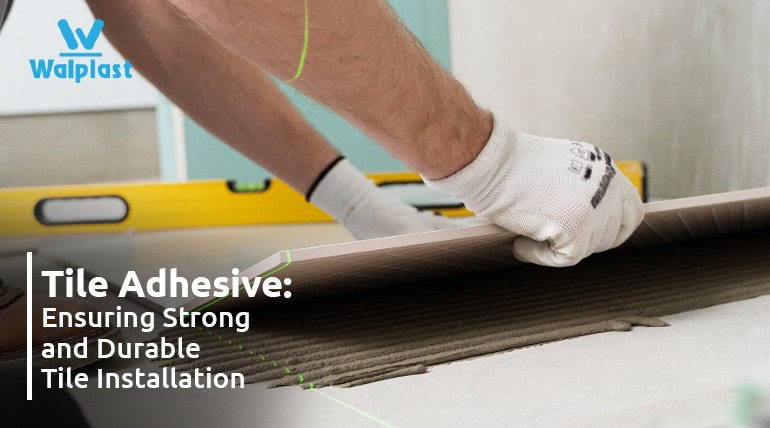
Tiling is an excellent way to upgrade the aesthetics of a space. Majority of Tiles are stain-resistant, durable, and easy to maintain, making them popular for interior renovations. When properly sealed, tiles are also water-resistant, making them a great choice for kitchens, washrooms, and mudrooms.
Proper tile installation is key to ensuring your tiles’ long-term durability and functionality. Improper tile installation can cause issues like uneven tile surfaces, unattractive gaps, or compromised structural.
A mixture of cement, sand, and water has been traditionally used to fix tiles. However, it doesn’t seem to be very effective. Currently, tile adhesive has gained popularity because of its durability, convenience, and versatility.
In this blog, let’s explore the nitty-gritty of tile adhesives.
What is Tile Adhesive?
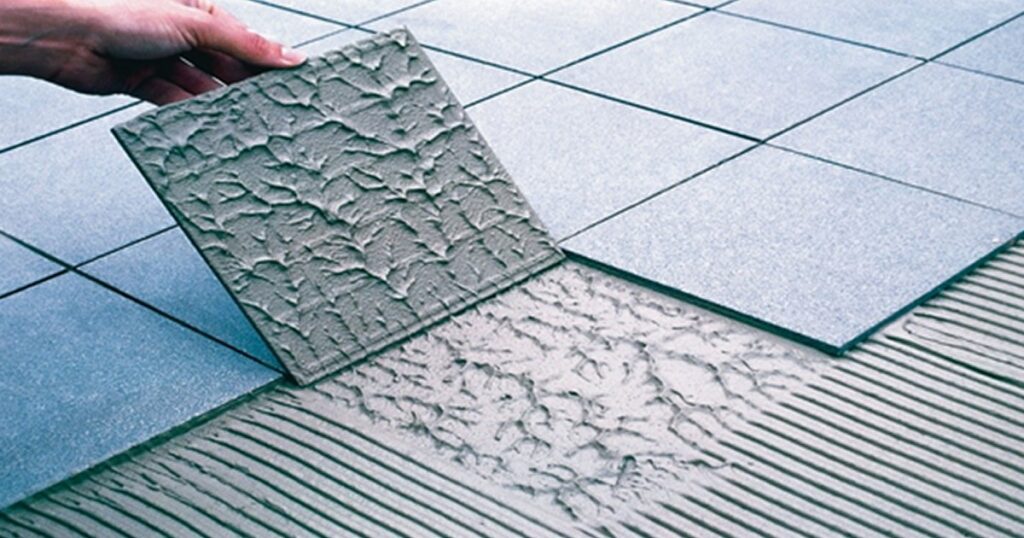
In simple terms, tile adhesive is the engineered mortar/ glue that fixes tiles to a substrate surface. It can be used to fix different types of tiles of various dimensions. This tile-fixing solution creates a firm connection between the tile and the underlying surface, helping reduce the risk of tiles cracking or coming loose over time.
Tile adhesive eliminates the need for traditional methods of using cement mortar and reduces installation effort and time. It’s specifically engineered to withstand the stress and strain tile surfaces face, including moisture, temperature changes, and heavy foot traffic.
Cement Mortar vs. Tile Adhesive: Which One Should You Choose?
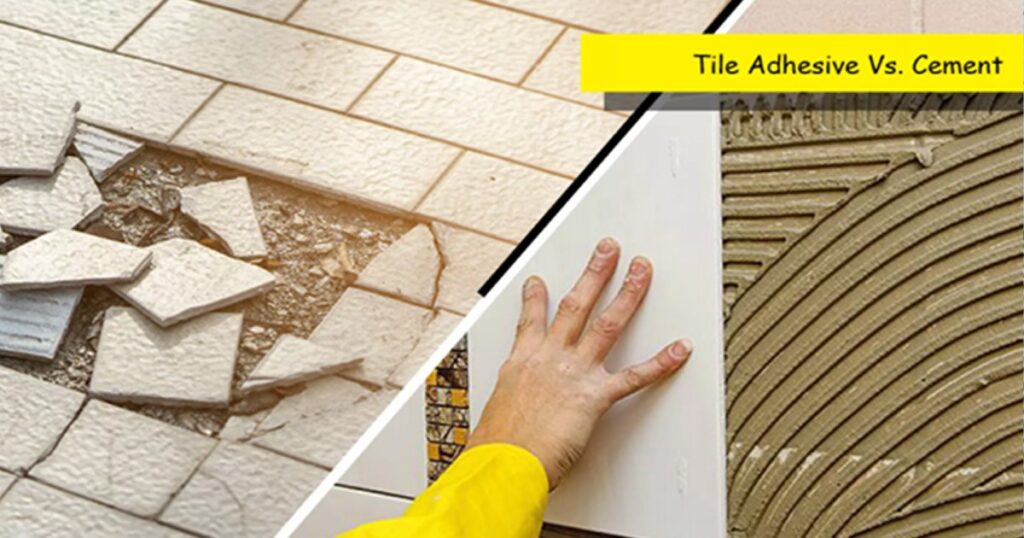
Today’s market offers tiles in a wide range of shapes, sizes, and materials, making them a popular choice for interior renovations. Not only do they enhance durability, but they also elevate the aesthetic appeal of any space.
Earlier, cement mortar and sand were typically used for tile installation. However, tile adhesives have become the go-to solution now, thanks to the many advantages they offer. Let us draw a comparison between the two:
Flexibility
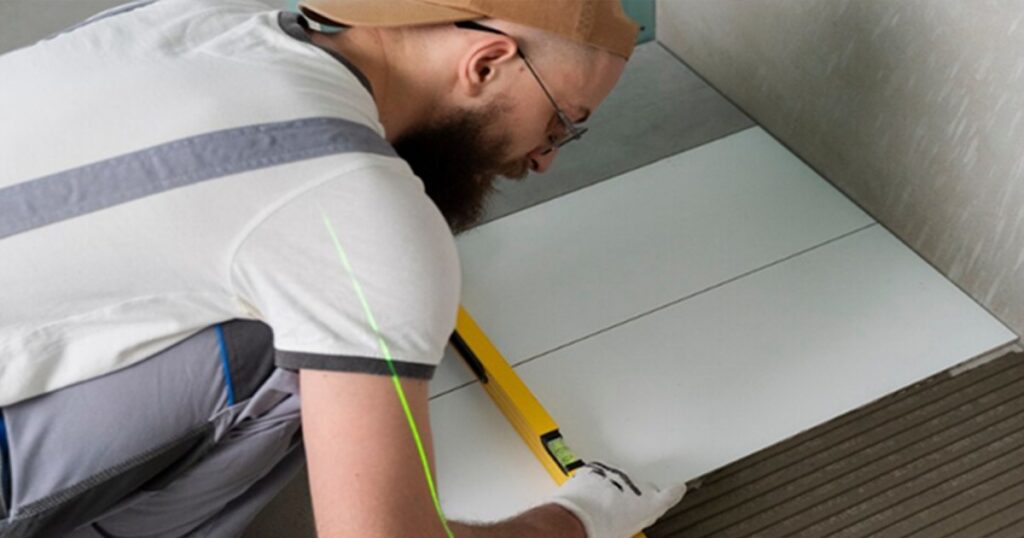
– Cement Mortar: Cement has been the traditional choice for laying tiles. However, one of its inherent drawbacks is that it shrinks as it dries, the shrinkage property of cement creates hollow spaces beneath the tiles. This can lead to cracking or the tiles detaching from the surface over time.
– Tile Adhesive: Tile adhesive provides a firm grip with zero shrinkage & thin bed application, which significantly reduces the chances of tiles breaking. Additionally, higher-grade tile adhesives can handle deformation effectively.
Installation Time
– Cement Mortar: The mixture of cement mortar used as an adhesive has to be prepared by adding cement and sand in proper proportions, making it a time-consuming process. Additionally, the open time for fixing tiles can be more than 20-30 minutes.
– Tile Adhesive: Tile adhesives are available in a ready-to-use format, eliminating the need for mixing and preparation. It is easy to prepare and apply, making it a time-efficient option. For larger tiles, extended open time products are available.
Curing:
Cement Motor: Cement mortar requires a curing period of 28 days. During this time, the mortar must be kept moist to ensure proper hydration and to achieve its full strength. This extended curing process can delay the overall project completion and needs careful monitoring to avoid cracks and structural issues.
Tile Adhesive: Tile adhesive does not require any curing time. Once applied, it sets quickly, allowing for faster installation and immediate use. This lack of curing not only speeds up the project timeline but also ensures a more efficient and hassle-free application process.
Perks of Choosing Tile Adhesive
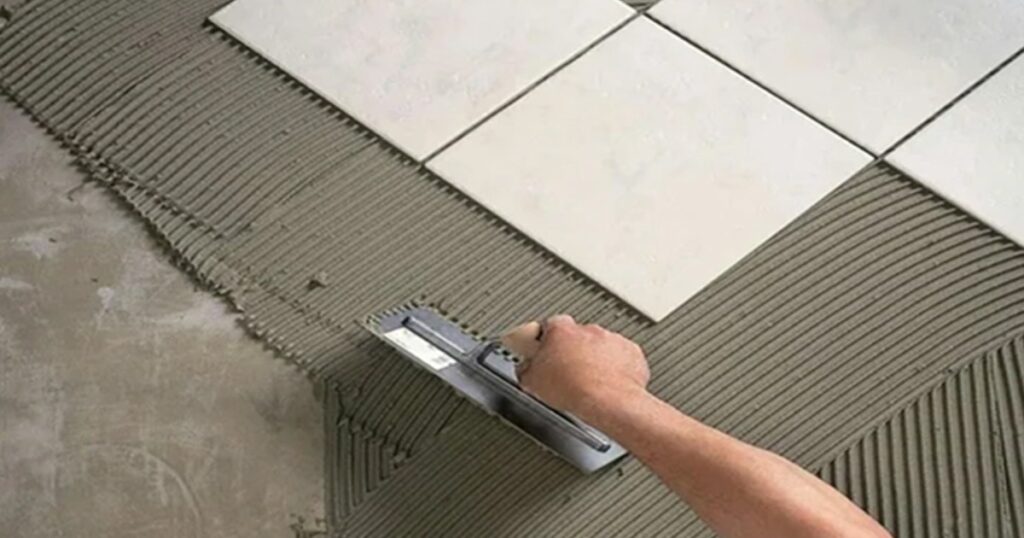
Using tile adhesive does have its advantages. They are:
1. Easy and Effective
Tile adhesive is extremely user-friendly and easy to work with. It is available in a ready-to-use form, saving a lot of time and effort required in the preparation of mortar cement. It has a smooth consistency, making it easy to apply and spread evenly. This ensures proper coverage and adhesion. This ease of using tile adhesives makes the tile installation process faster and more efficient.
2. Strength and Durability

Tile adhesives are specifically engineered to fix tiles on surfaces. They have excellent bonding strength, creating a strong and durable bond between the tile and the surface. This ensures that the tile does not crack, shift, or become loose over time.
Tiles can be used over a variety of surfaces, even areas prone to high traffic or moisture. To withstand this constant wear and tear, tile adhesive must be used to boost the overall performance and durability of the tiled surface.
3. Water-Resistant
Tiles are often used in places prone to moisture. Tile adhesives have water-resistant properties, making them perfect for areas such as bathrooms or kitchens. They create a barrier that prevents water penetration, reducing the risk of mold growth or water damage underneath the tiles. Some tile adhesives have moisture-control properties, allowing them to be used on damp surfaces.
4. Flexible and Stable
A multitude of tile adhesives offer different grades of flexibility and stability. They allow slight expansion and movement, which could occur due to temperature changes. This reduces the risk of tile breaking or cracking. The tile adhesive creates a stable base for tiles, ensuring they remain secure in place for a long period of time.
5. Cost-Effective

Using tile adhesives for tile installations is an economical approach. It does not require additional materials like mortar cement or sand, which reduces both material and labour costs. Additionally, tile adhesives offer long-term savings as they eliminate the cost of tile repair and replacement down the line.
Which Tile Adhesive to Choose?
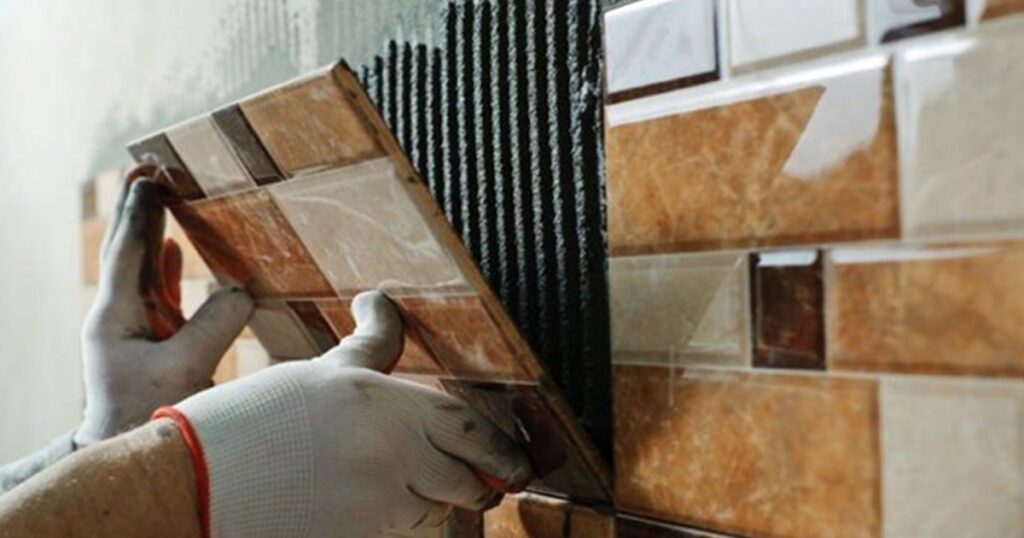
Choosing the right tile adhesive depends on various factors such as the type of tiles, location, size, area of application, weather conditions, and the substrate. Here’s a guide to help you make an informed decision:
Types of Tiles: Consider the material of your tiles, such as clay and ceramic, vitrified tiles, glass mosaic tiles, natural stone tiles, dense/granite/porcelain tiles, or basalt tiles etc.
Location: Determine whether the application is internal or external, on floors or walls (weathering free or included.
Size of Tiles: The size of your tiles matters. Common categories include tiles that are ≤300 x 300 mm, ≥300 x 300 ≤ mm, or ≥600 x 600 mm ≤, ≥ 1200 x 1200 ≤ etc.
Area of Application: Identify if the area is wet, dry, or subject to vibrations.
Weather Condition: Assess whether the area is submerged or dry.
Substrate: Check the base surface, be it cement-based, concrete, tiles, metal, gypsum, or plywood etc.
Different combinations of the above factors lead to choosing the appropriate grade of tile adhesive. You can follow the guidelines provided in IS 15477 for more detailed information.
Types of Tile Adhesives:
Type 1: Ideal for tiles with higher porosity and standard body composition. Commonly used for non-vitrified ceramic tiles and porous stones, making it a popular choice for indoor applications.
Type 2: Suitable for tiles with low porosity. Versatile for both indoor and outdoor settings, including areas exposed to dampness and submersion.
Type 3: Designed for outdoor applications on surfaces like concrete or plaster. It’s effective for vitrified tiles such as clay, ceramic, glass mosaic, or porcelain, as well as all-natural stone tiles.
Type 4: Best for tile installations on dry wallboard substrates. Perfect for drywall boards like plywood, gypsum boards, wood, and other dry surfaces.
Type 5: Specially formulated for installing tiles on metallic or glass surfaces. Ideal for glass tiles, metal tiles, and engineered stones.
Why Should You Buy Walplast Tile Adhesives?
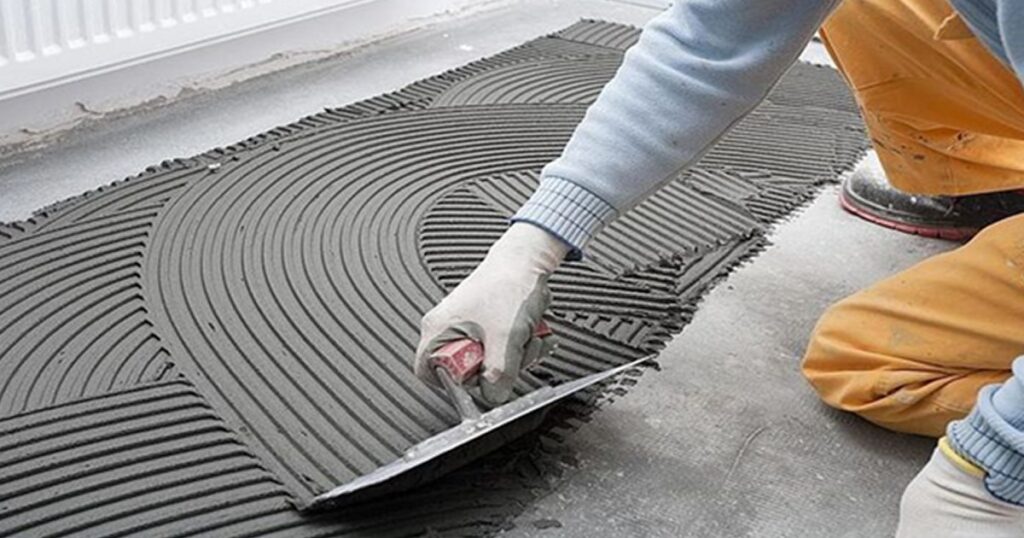
When it comes to tile installation, choosing the right adhesive is crucial for ensuring durability and aesthetic appeal. Here’s why Walplast tile adhesives stand out, power by the “4 Aces”:
1.The Power of Adhesion: Walplast’s Homesure Tile Expert Adhesives form a uniform, strong bond across the entire tile surface. This consistent adhesion ensures that tiles remain securely in place, reducing the risk of detachment or breakage over time.
2. The Power of Super Easy Application: These adhesives are pre-mixed and ready to use, offering consistent quality with every application. Their single-component, hassle-free nature simplifies the installation process, making it efficient even for those with minimal technical expertise.
3. The Power of Better Accessibility: Walplast offers a wide range of tile adhesives tailored to various types of tiles and substrates. Whether you need an adhesive for clay, ceramic, vitrified, glass mosaic, or natural stone tiles, Walplast has a specific variant to meet your precise needs.
4. The Power of Aqua Safety: Homesure Tile Expert Adhesives are highly polymer-enriched, providing excellent underwater shear bond properties. This makes them perfect for wet areas, ensuring tiles remain securely in place even in submerged conditions.
Additional Benefits:
High Quality and Reliability: As an ISO 9001:2015 certified company, Walplast ensures top-notch quality and performance in all its products. Their rigorous quality control processes comply with both national and international standards.
Cost-Effective Solutions: Walplast tile adhesives save time and resources, reducing labor costs due to their ease of application. Their strong, long-lasting bond minimizes the need for repairs and replacements, offering long-term savings.
Sustainability Commitment: Walplast is dedicated to sustainable growth, balancing economic development with environmental care and social well-being. Their commitment to sustainability and corporate responsibility makes them a reliable and ethical choice for your construction needs.
Global Presence: With a strong international footprint, Walplast exports its products to numerous countries, reflecting their commitment to quality and customer satisfaction across borders.
Choosing Walplast tile adhesives means opting for a product backed by extensive research, stringent quality control, and a company dedicated to innovation and sustainability. Make the smart choice for your tiling projects with Walplast.
Summing Up
Tile adhesives have been specially formulated to fix tiles to different surfaces. These adhesives enhance the quality of how tiles bond with surfaces and are designed to accommodate temperature changes and physical movements.
Are you in search of a top-quality tile adhesive? Check out the tiling solutions by Walplast. Our goal is to provide quality solutions to our customers, helping them build spaces with top-notch materials.
